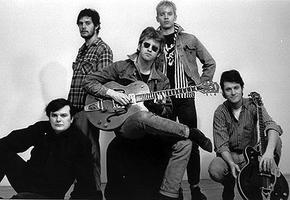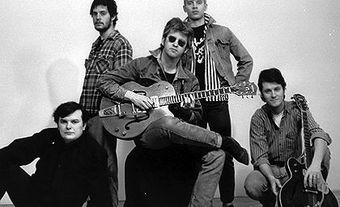
Blue Rodeo. Rock band, formed in 1984 in Toronto by songwriters Jim Cuddy and Greg Keelor (vocals, guitars), with Bobby Wiseman (organ, piano, accordion), Bazil Donovan (bass) and Cleave Anderson (drums). Anderson was replaced in 1989 by Mark French. Cuddy and Keelor had previously worked together in the Hi-Fi's (Toronto, 1978-81) and Fly to France (New York, 1981-4). Blue Rodeo made its debut in February 1985 and soon established a rigorous performing schedule, initially in bars in the Queen Street West district of Toronto (eg, the Horseshoe Tavern) and later in clubs and halls across Canada and in the US. It made some 250 appearances annually, among them many shows in remote Canadian communities - eg, Wikwemikong (Manitoulin Island, Ont), Frobisher Bay (Baffin Island), and Churchill Falls (Labrador).
Its affinity for the "roots music" styles of US pop - country, rockabilly, and folk-rock, as well as rock 'n' roll - initially drew Blue Rodeo comparisons to The Band and gave it both a populist and critical appeal. Craig MacInnis (Toronto Star, 18 Dec 1988) noted, "Contradictions are what make good bands great, of course, and Blue Rodeo has a surplus: Jim Cuddy's keening tenor vs. Greg Keelor's ironic rasp; Bobby Wiseman's jazzy keyboard arpeggio vs. the astringent buzz of dual rock guitars; cool, romantic ballads ("Try," "Rebel") vs. tough, cerebral narratives ("Piranha Pool," "Outskirts")."
Blue Rodeo's first album, Outskirts, issued in 1987, included "Try," a major pop and country hit in Canada. The songs "Outskirts" and "Rose Coloured Glasses" were also popular. Blue Rodeo's second album, Diamond Mine, followed in 1989; the title song and "How Long" were popular. A third album, Casino (WEA CD-72770), issued late in 1990, included the Canadian hits "'Til I Am Myself Again" and "Trust Yourself" and had some US success. Domestic sales of Diamond Mine and Casino exceeded 100,000, and those of Outskirts, 200,000.
Blue Rodeo appeared in England and West Germany in 1988 and 1989, performed at the Montreux Jazz Festival in Switzerland in 1989, and was seen briefly in the US feature film Postcards from the Edge in 1990. It won several Big Country awards in 1988 (eg, outstanding new artists, group, composers and single of the year), the CCMA award in 1988 as "rising star," and Juno awards in 1989 for best single and video ("Try"), and annually 1989-91 as group of the year.
Lost Together, the last album featuring keyboardist Bob Wiseman and the first to feature drummer Glenn Milchem and steel guitarist Kim Deschamps, was released in 1992. The title track, "Rain Down On Me," and "Flying" were the key singles that pushed the album to double-platinum status for selling 200,000 copies in Canada.
Blue Rodeo's most successful record, Five Days In July, followed in 1993 and went on to sell 600,000 copies. The acoustic-based album was recorded on Keelor's farm near Peterborough, Ontario, and the title refers to the amount of time it took to record. The album was the first to feature keyboardist James Gray and it also included contributions from singer Sarah McLachlan, guitarist Colin Linden and cellist Anne Bourne. "Hasn't Hit Me Yet" and "5 Days in May" were both top 10 Canadian hits.
McLachlan made another appearance on 1995's more electrified and rockier Nowhere To Here, which reached number two on the Canadian sales chart, the highest position of any Blue Rodeo album to date. It was certified double-platinum on the strength of top 10 singles "Side Of The Road" and "Better Off As We Are."
Tremolo sold 100,000 copies following its 1997 release and spawned a major hit in "It Could Happen To You." Blue Rodeo's first live album, a two-disc effort titled Just Like A Vacation, followed in 1999 and was likewise certified platinum.
Blue Rodeo began the new millennium by replacing Deschamps with former Wilco member Bob Egan and releasing The Days In Between, which featured the single "Somebody Waits." It received gold certification for selling 50,000 copies.
Greatest Hits , Vol. 1 featured singles from every Blue Rodeo album except the still relatively current The Days In Between when it was released in 2001. The album also included a newly recorded cover of the Bee Gees' "To Love Somebody." The compilation sold 200,000 copies in Canada and was issued in the United States three years after its domestic release.
The platinum-certified 2002 release Palace Of Gold was the first studio album featuring Egan and the first to be recorded in The Woodshed, a studio that the band created after buying a Toronto building. Palace Of Gold also had welcomed extra dimensions with contributions from the Bushwhack Horns and a 10-piece string section.
A DVD titled Blue Rodeo in Stereovision, featuring a variety of live performance clips, filled a gap between albums when it was released in 2004. It won a 2005 Juno for best music DVD.
Blue Rodeo's next record, 2005's Are You Ready, was the last to feature keyboardist Gray. The Chieftains' Paddy Moloney and The Sadies' Travis Good appeared on the album, which was certified gold. Small Miracles followed in 2007 and won 2008 Junos for group of the year, best adult alternative album and best music video for "C'mon."
A DVD/CD titled Blue Road featured live performances and a documentary and was issued in 2008. Blue Rodeo's 12th studio record, The Things We Left Behind, became its first non-live double album in 2009. The band received a star on Canada's Walk of Fame in Toronto that same year. An eight-disk box set titled Blue Rodeo 1987-1993 was released in 2012. Consisting of remastered versions of the band's first five recordings and other previously unreleased material, the set featured a version of the group's first album Outskirts in a completely new remix by Greg Keelor.
Blue Rodeo has been named group of the year a record-setting five times at the Juno Awards and its albums have combined to sell in excess of four million copies worldwide. The band continues to tour regularly and performed during the halftime show of the nationally televised 2009 Grey Cup football game in Calgary.
Blue Rodeo members also make music outside of the band. Cuddy's two solo albums, 1998's All In Time and 2006's The Light That Guides You Home, were both certified gold. In 2011, he released the urban flavoured Skyscraper Soul. Keelor has released three solo records: 1996's Gone, 2005's Seven Songs For Jim and 2006's Aphrodite Rose. Donovan released a solo album titled Matinee in 2008 and Egan issued a self-titled effort in 1998, The Promise in 2002 and The Glorious Decline in 2006. Milchem has a band called The Swallows that has put out three records: Turning Blue (2000), Beauty of Our Surroundings (2002) and Awkward Situation (2006).
Blue Rodeo was inducted into the Canadian Music Hall of Fame at the Juno Awards in 2012.

 Share on Facebook
Share on Facebook Share on X
Share on X Share by Email
Share by Email Share on Google Classroom
Share on Google Classroom

